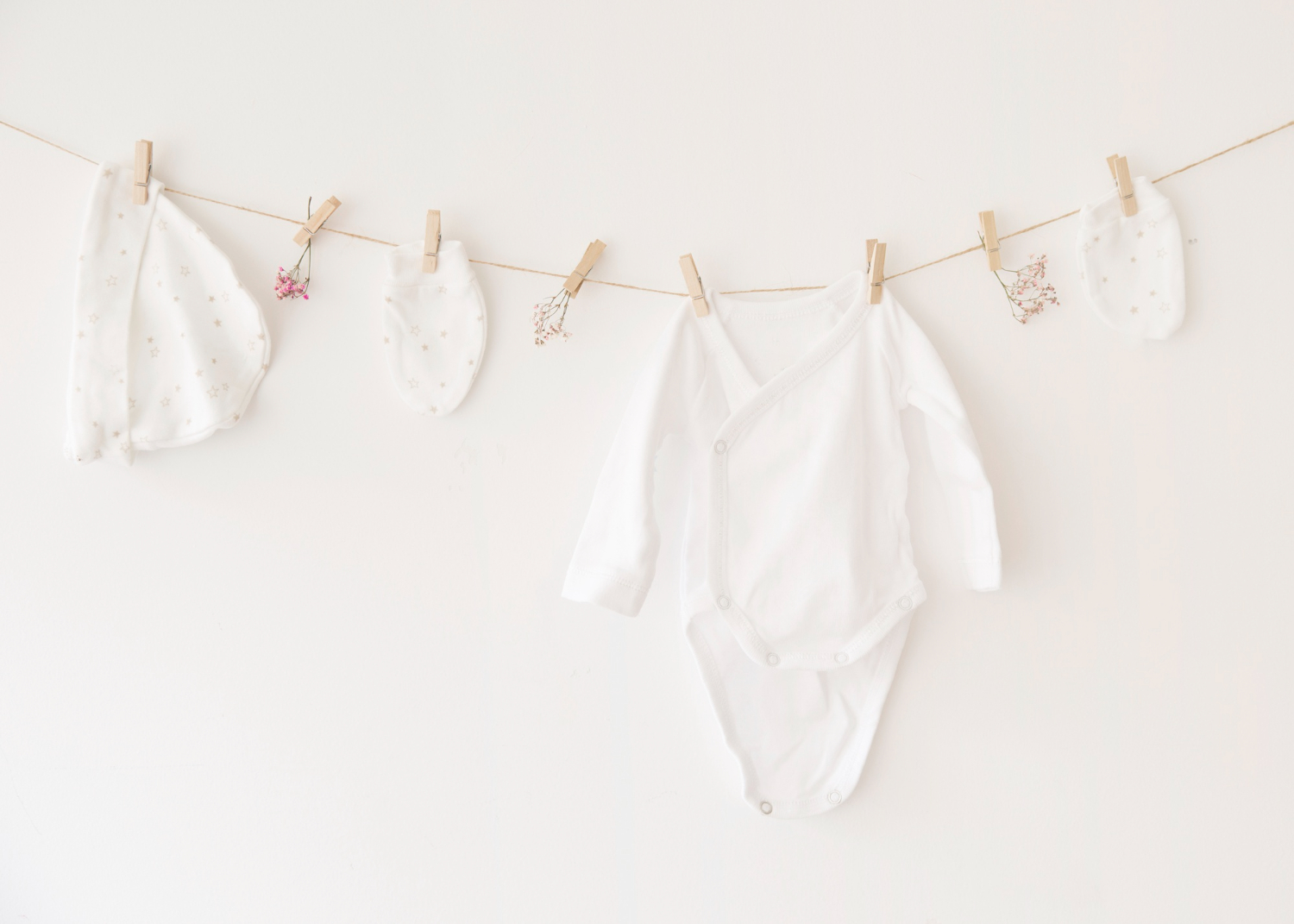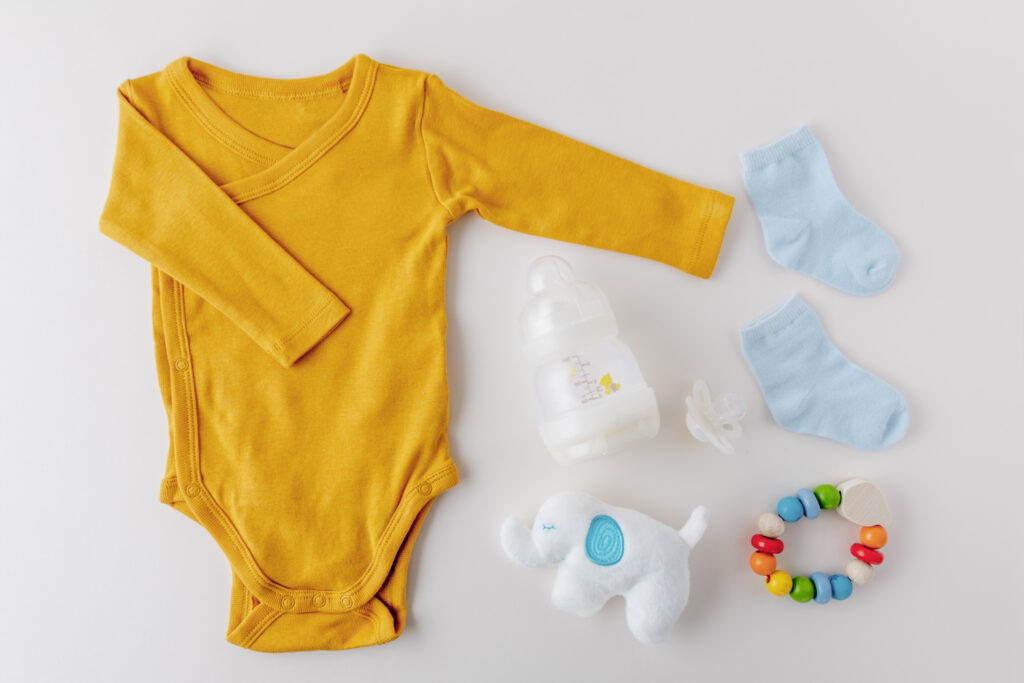Introduction: Why Organic Cotton Matters for Your Baby’s Clothing
Choosing the right clothing for your baby is a crucial decision that every parent faces. With so many options available, it’s easy to get overwhelmed. However, if you prioritize your baby’s comfort and health, Organic Cotton Baby Clothing should be at the top of your list. Organic cotton is grown without the use of harmful chemicals or synthetic fertilizers, ensuring that your baby’s skin is only in contact with natural, safe fibers.
But what does it mean when we talk about “certified organic cotton”? How does it differ from conventional cotton? And why should you consider making the switch to organic cotton baby clothing? In this post, we’ll delve deep into these questions and more, providing you with the information you need to make the best choice for your little one.
1. Understanding Organic Cotton: What Makes It Special?
What is Organic Cotton?
Organic cotton is grown using methods that have a low environmental impact. This means no synthetic fertilizers, pesticides, or genetically modified organisms (GMOs) are used. The process of growing and harvesting organic cotton is also designed to promote and enhance biodiversity and soil health, making it a more sustainable option for the planet.
Why Organic Cotton is Better for Babies
When it comes to baby clothing, organic cotton stands out for its softness and breathability. Babies have delicate skin that can easily be irritated by harsh chemicals found in conventional cotton. By choosing Organic Cotton Baby Clothing, you’re ensuring that your baby is wrapped in natural, gentle materials that are free from toxins.
2. The Certification Process: Ensuring Quality and Safety
What Does Certification Mean?
To be labeled as organic, cotton must meet stringent standards set by organizations like the Global Organic Textile Standard (GOTS). These certifications guarantee that the cotton is grown, harvested, and processed without the use of harmful chemicals.
Why Certification Matters for Baby Clothes
Certification is essential for baby clothing because it ensures that the product you’re buying is truly organic. Certified Organic Cotton Baby Clothing has been tested and verified, so you can trust that it’s free from harmful substances that could harm your baby’s skin or overall health.
3. The Benefits of Organic Cotton for Babies
Gentle on Sensitive Skin
Babies have sensitive skin that’s prone to irritation. Conventional cotton often contains residues from pesticides and dyes that can cause allergic reactions or rashes. Organic Cotton Baby Clothing eliminates this risk, providing a softer, hypoallergenic alternative.
Breathability and Comfort
Organic cotton is known for its breathability, which helps regulate your baby’s body temperature. This is particularly important for newborns who cannot regulate their temperature as effectively as older children. Clothing made from organic cotton allows your baby’s skin to breathe, reducing the risk of overheating and keeping them comfortable.
4. Free from Harmful Chemicals: What’s Not in Organic Cotton Baby Clothing
No Pesticides or Herbicides
Conventional cotton farming relies heavily on pesticides and herbicides, many of which are classified as hazardous by the World Health Organization (WHO). These chemicals can linger in the fabric, potentially causing harm to your baby’s skin. Organic Cotton Baby Clothing is free from these dangerous substances, offering a safer option.
No Synthetic Dyes or Finishes
The dyes used in conventional clothing can contain harmful chemicals like formaldehyde, which can irritate the skin. Organic cotton clothing uses natural or low-impact dyes, which are much safer for your baby. Additionally, organic cotton is often left in its natural, undyed state, further reducing the risk of irritation.
5. Environmental Impact: Organic Cotton vs. Conventional Cotton
Sustainable Farming Practices
Organic cotton farming practices are designed to protect the environment. This includes crop rotation, composting, and the use of natural predators to control pests. These methods help maintain soil fertility, reduce water usage, and minimize the overall environmental footprint.
Reducing Water Usage
One of the significant benefits of organic cotton is that it requires less water to grow than conventional cotton. This is because organic farming practices improve soil health, allowing the soil to retain moisture better. By choosing Organic Cotton Baby Clothing, you’re supporting a more sustainable use of our planet’s resources.
6. The Softness of Organic Cotton: A Touch Your Baby Will Love
Natural Softness
Organic cotton is naturally soft, making it ideal for baby clothing. The absence of harsh chemicals means that the cotton fibers remain intact and soft, providing a gentle touch against your baby’s delicate skin.
Durability and Longevity
Not only is organic cotton soft, but it’s also durable. Clothing made from organic cotton can withstand repeated washing and wear, maintaining its softness and shape over time. This durability makes Organic Cotton Baby Clothing a smart investment for parents who want quality clothing that lasts.
7. Supporting Ethical and Fair Trade Practices
Fair Wages for Farmers
When you buy certified organic cotton clothing, you’re supporting fair trade practices. This ensures that farmers receive fair wages and work under safe conditions. Many organic cotton certifications also include social criteria, ensuring that the workers who produce the cotton are treated ethically.
Empowering Communities
Organic cotton farming can have a positive impact on local communities by promoting sustainable farming practices and reducing exposure to harmful chemicals. By choosing Organic Cotton Baby Clothing, you’re contributing to a system that values people and the planet.
8. The Health Benefits of Organic Cotton Baby Clothing
Reduced Risk of Allergies
Many babies develop allergies to the chemicals used in conventional clothing. Organic cotton is hypoallergenic, reducing the risk of allergic reactions and providing a safer option for babies with sensitive skin.
Better for Overall Health
The absence of harmful chemicals in organic cotton means that your baby’s clothing is free from toxins that could be absorbed through the skin. This is particularly important for babies, whose skin is more permeable than adults, making them more vulnerable to the effects of these substances.
9. Why Parents are Switching to Organic Cotton Baby Clothing
A Growing Trend
More and more parents are becoming aware of the benefits of organic cotton and are making the switch to Organic Cotton Baby Clothing. This growing trend reflects a broader shift towards sustainability and health-conscious consumer choices.
Peace of Mind
Knowing that your baby’s clothing is free from harmful chemicals provides peace of mind. You can rest easy knowing that you’re making the best choice for your baby’s health and well-being.
10. The Cost of Organic Cotton Baby Clothing: Is It Worth It?
Understanding the Price Tag
Organic cotton baby clothing often comes with a higher price tag than conventional cotton. However, this price reflects the true cost of producing clothing that’s safe, ethical, and sustainable.
Value Over Time
While the initial cost may be higher, the durability and quality of Organic Cotton Baby Clothing mean that it often lasts longer, making it a more economical choice in the long run. Additionally, the peace of mind that comes with knowing your baby’s clothing is free from harmful chemicals is invaluable.
11. How to Identify Certified Organic Cotton Baby Clothing
Looking for the Label
When shopping for organic cotton baby clothing, look for certification labels such as GOTS (Global Organic Textile Standard) or OEKO-TEX. These labels ensure that the clothing is made from organic cotton and meets strict environmental and social criteria.
Beware of Greenwashing
Not all products labeled as “organic” are truly organic. Some companies use the term to market their products without meeting the necessary standards. Always check for certification to ensure that you’re buying genuine Organic Cotton Baby Clothing.
12. The Role of Organic Cotton in Sustainable Fashion
A Step Towards Sustainability
Organic cotton is a crucial component of sustainable fashion. By choosing Organic Cotton Baby Clothing, you’re supporting a movement that prioritizes the health of the planet and the people who produce our clothing.
Reducing Waste
Sustainable fashion isn’t just about the materials used; it’s also about reducing waste. Organic cotton clothing is often designed to be durable, reducing the need for frequent replacements and contributing to a more sustainable wardrobe.
13. The Impact of Organic Cotton on the Environment
Less Pollution
The farming of conventional cotton contributes to significant environmental pollution, from chemical runoff to water contamination. Organic cotton farming reduces these harmful impacts, making it a more environmentally friendly choice.
Promoting Biodiversity
Organic cotton farming practices promote biodiversity by avoiding harmful chemicals that can damage ecosystems. This approach helps maintain healthy ecosystems and supports a variety of plant and animal life.
14. Organic Cotton Baby Clothing: A Gift for New Parents
A Thoughtful and Safe Choice
Organic cotton baby clothing makes a thoughtful and safe gift for new parents. By choosing Organic Cotton Baby Clothing, you’re giving a gift that prioritizes the baby’s health and comfort.
Supporting a Healthier Future
When you give organic cotton baby clothing, you’re not just giving a present; you’re supporting a healthier future for the baby and the planet. This makes it a gift with lasting value.
15. How to Care for Organic Cotton Baby Clothing
Washing and Drying Tips
To extend the life of your Organic Cotton Baby Clothing, wash it in cold water with a mild detergent and avoid using bleach or fabric softeners. Air drying is preferable, as it helps maintain the fabric’s natural softness and durability.
Storing Organic Cotton Baby Clothing
Store organic cotton baby clothing in a cool, dry place, away from direct sunlight. This will help preserve the fabric’s color and quality, ensuring that it remains soft and safe for your baby.
16. Organic Cotton Baby Clothing: A Choice for the Future
Investing in the Next Generation
By choosing Organic Cotton Baby Clothing, you’re making an investment in the future. Organic cotton supports sustainable farming practices, reduces environmental impact, and provides a safer option for your baby’s clothing.
A Legacy of Health and Sustainability
Choosing organic cotton is a way to leave a legacy of health and sustainability for future generations. It’s a small but significant step towards a better world for your baby and for all of us.
17. Organic Cotton Baby Clothing and Global Impact
Supporting Global Change
The demand for organic cotton is growing globally, leading to positive changes in agricultural practices and environmental stewardship. By choosing Organic Cotton Baby Clothing, you’re contributing to this global movement towards a more sustainable and ethical fashion industry.
Connecting with a Community
When you choose organic cotton, you’re joining a community of conscious consumers who value health, sustainability, and ethical practices. This global community is making a difference, one purchase at a time.
18. Organic Cotton Baby Clothing: Trends and Innovations
What’s New in Organic Cotton Baby Clothing?
The world of organic cotton baby clothing is constantly evolving, with new styles, designs, and innovations emerging regularly. From adorable prints to functional designs, there’s always something new to explore.
Innovative Fabrics and Blends
While pure organic cotton remains a popular choice, many brands are exploring innovative blends that combine organic cotton with other sustainable materials like bamboo or hemp. These blends offer unique benefits, such as increased softness, durability, and moisture-wicking properties.
19. The Future of Organic Cotton Baby Clothing
Growing Awareness
As more parents become aware of the benefits of organic cotton, the demand for Organic Cotton Baby Clothing is expected to continue growing. This increased demand will drive further innovations and improvements in the industry.
A Bright Future for Babies and the Planet
The future looks bright for organic cotton baby clothing. With continued advancements in sustainable farming practices and fabric technology, organic cotton will remain a top choice for parents who want the best for their babies and the planet.
20. How to Transition to an Organic Cotton Wardrobe for Your Baby
Start with Essentials
If you’re new to organic cotton, start by replacing your baby’s everyday essentials, such as onesies, pajamas, and blankets. These are the items that come into the most contact with your baby’s skin, so it’s essential to choose organic.
Expand Over Time
As you become more familiar with the benefits of organic cotton, you can gradually expand your baby’s wardrobe to include more organic pieces. Over time, you’ll find that making the switch to Organic Cotton Baby Clothing is easier than you might have thought.
Key Points Recap
- Organic cotton is grown without harmful chemicals: This ensures that your baby’s clothing is free from toxins and safer for their delicate skin.
- Certification matters: Look for certified organic cotton labels to ensure the clothing meets stringent environmental and social standards.
- Softness and breathability: Organic cotton is naturally soft and breathable, making it ideal for baby clothing.
- Sustainability and environmental impact: Organic cotton farming practices are better for the environment, reducing pollution and promoting biodiversity.
- A thoughtful choice for the future: Choosing organic cotton is an investment in your baby’s health and the planet’s future.
10 FAQs About Organic Cotton Baby Clothing
- What is organic cotton? Organic cotton is cotton grown without synthetic fertilizers, pesticides, or GMOs, making it safer and more sustainable.
- Why should I choose organic cotton for my baby? Organic cotton is free from harmful chemicals, making it a safer and gentler option for your baby’s sensitive skin.
- Is organic cotton more expensive? Yes, organic cotton is often more expensive due to its sustainable farming practices, but its durability and quality make it a worthwhile investment.
- How can I tell if baby clothing is made from organic cotton? Look for certification labels like GOTS or OEKO-TEX, which ensure the clothing meets strict organic standards.
- Does organic cotton last longer? Yes, organic cotton is durable and often lasts longer than conventional cotton, especially when cared for properly.
- Are the dyes used in organic cotton clothing safe? Yes, organic cotton clothing typically uses natural or low-impact dyes that are safer for your baby’s skin.
- Is organic cotton hypoallergenic? Organic cotton is less likely to cause allergic reactions because it’s free from harsh chemicals and synthetic additives.
- How do I care for organic cotton baby clothing? Wash in cold water with a mild detergent, avoid bleach, and air dry to maintain the fabric’s softness and durability.
- Is organic cotton environmentally friendly? Yes, organic cotton farming practices are designed to reduce environmental impact and promote sustainability.
- Can I find stylish organic cotton baby clothing? Absolutely! There’s a wide range of stylish and adorable organic cotton baby clothing available, from basics to trendy pieces.


